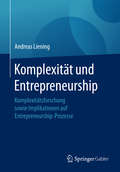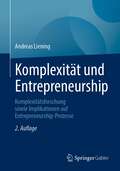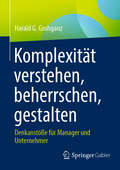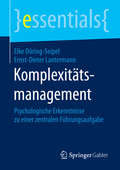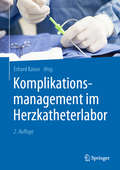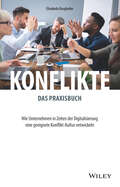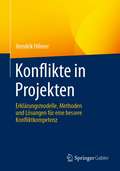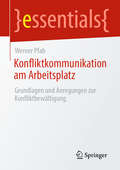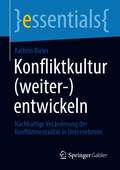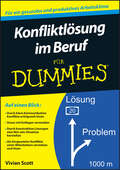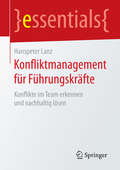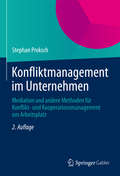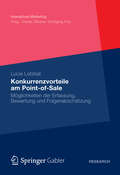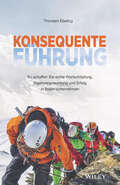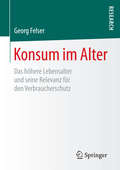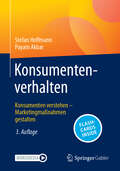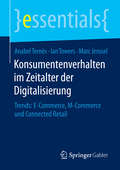- Table View
- List View
Komplexität und Entrepreneurship
by Andreas LieningAusgehend von der Fragestellung, welche systematischen Besonderheiten im Verhalten von Führungskräften und Entrepreneuren zu berücksichtigen sind, wird in diesem Buch eine neue theoretische Perspektive für unternehmerisches Analysieren, Bewerten, Entscheiden und Handeln bereitgestellt. Dazu werden verschiedene Theorien Komplexer Systeme, wie etwa die Theorie der Selbstorganisation (Synergetik) dargestellt. Ferner werden methodische Ansätze zur empirischen Untersuchung von Komplexität und die sich hieraus ergebenden Konsequenzen im Bereich Entrepreneurship diskutiert.Insgesamt zeigt sich, dass alte Modelle wie das Laplacesche Weltbild oder Kants Frage, was wir wissen können, überdacht werden müssen. Dieses Buch hält überraschende Antworten bereit, die insbesondere in komplexen Prozessen wie etwa einer Unternehmensgründung neue Chancen und Möglichkeiten offenbaren.
Komplexität und Entrepreneurship: Komplexitätsforschung sowie Implikationen auf Entrepreneurship-Prozesse
by Andreas LieningAusgehend von der Fragestellung, welche systematischen Besonderheiten im Verhalten von Führungskräften und Entrepreneuren zu berücksichtigen sind, wird in diesem Buch eine neue theoretische Perspektive für unternehmerisches Analysieren, Bewerten, Entscheiden und Handeln bereitgestellt. Dazu werden verschiedene Theorien Komplexer Systeme, wie etwa die Theorie der Selbstorganisation (Synergetik) dargestellt. Ferner werden methodische Ansätze zur empirischen Untersuchung von Komplexität und die sich hieraus ergebenden Konsequenzen im Bereich Entrepreneurship diskutiert. Insgesamt zeigt sich, dass alte Modelle wie das Laplacesche Weltbild oder Kants Frage, was wir wissen können, überdacht werden müssen. Dieses Buch hält überraschende Antworten bereit, die insbesondere in komplexen Prozessen wie etwa einer Unternehmensgründung neue Chancen und Möglichkeiten offenbaren.Die zweite erweiterte und aktualisierte Auflage verstärkt den Fokus auf Entrepreneurship als Schwerpunkt des Buches. Sie enthält neue und aktuelle Beispiele aus der realen Wirtschaft, sowie weitere empirische Daten, die die Modelanalyse untermauern.
Komplexität und Entrepreneurship: Komplexitätsforschung sowie Implikationen auf Entrepreneurship-Prozesse
by Andreas LieningAusgehend von der Fragestellung, welche systematischen Besonderheiten im Verhalten von Führungskräften und Entrepreneuren zu berücksichtigen sind, wird in diesem Buch eine neue theoretische Perspektive für unternehmerisches Analysieren, Bewerten, Entscheiden und Handeln bereitgestellt. Dazu werden verschiedene Theorien Komplexer Systeme, wie etwa die Theorie der Selbstorganisation (Synergetik) dargestellt. Ferner werden methodische Ansätze zur empirischen Untersuchung von Komplexität und die sich hieraus ergebenden Konsequenzen im Bereich Entrepreneurship diskutiert.Insgesamt zeigt sich, dass alte Modelle wie das Laplacesche Weltbild oder Kants Frage, was wir wissen können, überdacht werden müssen. Dieses Buch hält überraschende Antworten bereit, die insbesondere in komplexen Prozessen wie etwa einer Unternehmensgründung neue Chancen und Möglichkeiten offenbaren.
Komplexität verstehen, beherrschen, gestalten: Denkanstöße für Manager und Unternehmer
by Harald G. GrohganzKomplexität ist eine zentrale Herausforderung der heutigen Zeit. Unternehmen klagen über ein unkontrolliertes Anwachsen ihres Produktportfolios, immer neue Anforderungen führen zu ausufernden, ineffizienten Geschäftsprozessen. Etablierte Strukturen glauben, bestehende Vorteile zu sichern und verhindern damit Innovationen. Auch im gesellschaftlichen Kontext sorgt die zunehmende Informationsflut für radikales Ausweichverhalten und einst verschiedene Ansichten werden zu unüberwindbaren Gräben. In diesem Fachbuch wird Komplexität in ihren vielfältigen Erscheinungsformen und Auswirkungen anekdotisch und anhand realer Situationen aus Unternehmens- und Alltagssituationen vorgestellt. Zunächst die Theorie: Welche Arten der Komplexität gibt es? Warum führt Komplexität zu Problemen? Warum wird Komplexität manchmal bewusst aufgebaut und wie lässt sie sich reduzieren? Reflexionsfragen helfen bei der eigenen Standortbestimmung und regen zum Nachdenken an. Anschließend die Praxis: Der Autor stellt verschiedene Beispiele für Komplexität in Unternehmen und auf gesellschaftlicher Ebene vor, beleuchtet deren Umfeld und erläutert Lösungsmöglichkeiten. Der Inhalt Was ist Komplexität? Umgang mit Komplexität: verstehen, beherrschen, gestalten Realität und Modelle, Aufbau und Reduktion Komplexität in der Praxis: Variantenmanagement, Unternehmensplanung, Softwareentwicklung, Projektmanagement und Datenanalysen
Komplexitätsmanagement: Psychologische Erkenntnisse zu einer zentralen Führungsaufgabe (essentials)
by Elke Döring-Seipel Ernst-Dieter LantermannDieses Essential analysiert, wie Komplexität in die Realität von Unternehmen hineinwirkt und welche Implikationen sich daraus für Führung und Führungshandeln ergeben. Aus psychologischer Sicht bilden komplexe Anforderungen eine besondere Herausforderung für die Handlungsorganisation von Akteuren und Entscheidungsträgern. Individuen, Teams und Unternehmen orientieren sich im Umgang mit komplexen Anforderungen vor allem an der Leitidee der Komplexitätsreduzierung. Die Autoren benennen daraus resultierende typische Fehler. Vor diesem Hintergrund formulieren sie Anforderungen an gutes Komplexitätsmanagement, das eine komplexitätsanerkennende Unternehmenskultur sowie eine Erweiterung des traditionellen Führungsprofils voraussetzt.
Komplikationen in der Urologie: Risiken erkennen und vermeiden
by Jennifer Kranz Petra Anheuser Joachim A. SteffensDieses Buch schildert Komplikationen und Zwischenfälle aus dem gesamten Fachbereich der Urologie. Neben konservativen und operativen Therapieoptionen werden auch die Indikationsstellung verschiedener Verfahren sowie diagnostische Maßnahmen einbezogen. Unter Berücksichtigung des aktuellen Wissenstandes bietet das Buch Strategien zur Vermeidung und Therapievorschläge zur Beherrschung von Komplikationen. Häufigkeitsangaben typischer, aber auch seltener Komplikationen werden systematisch aufgeführt. Der urologisch tätige Arzt erhält Tipps für ein strukturiertes Risikomanagement.Für alle operativ tätigen Urologen und niedergelassenen Fachärzte, aber auch zur Erstellung von Gutachten, dient es als wertvolle Lektüre.
Komplikationsmanagement im Herzkatheterlabor
by Erhard KaiserIn diesem ersten deutschsprachigen Werk zum Thema zeigt der Autor, wie Komplikationen vor, während und nach Koronarinterventionen vermieden und gehandhabt werden können. Der Facharzt (Innere Medizin und Kardiologe) und Leitende Notarzt hat ein Buch für den Einsatz in der Praxis geschrieben und sich dabei an den Leitlinien der Deutschen Gesellschaft für Kardiologie orientiert.
KONE: The MonoSpace Launch in Germany
by Das Narayandas Gordon SwartzFocuses on the launch of a new elevator product in Germany. In 1996, global construction slumps and low differentiation among competitive offerings has led to significant price competition and margin erosion in the elevator industry. In these circumstances, KONE, one of the global players in this industry, has developed the Monospace elevator product that uses revolutionary technologies. This new product is expected to have a significant impact on the current product lines of KONE and its competitors. The firm has test marketed the product in three European country markets to varying degrees of success. The firm is now planning to launch the new product in Germany, the largest country market in Europe and vital to KONE's overall success. With little room for error and the future of the firm at stake, KONE's German subsidiary needs to develop a detailed launch plan for Monospace in Germany.
Konflikte - das Praxisbuch: Wie Unternehmen in Zeiten der Digitalisierung eine geeignete Konflikt-Kultur entwickeln
by Elisabeth BurghoferKonflikte sind höchst wertvoll, aber ihr Nutzen für Organisationen wird nicht erkannt und schon gar nicht gewürdigt. In unseren Arbeitswelten werden Konflikte erstaunlich lange ignoriert und ausgesessen. Dieses Verhalten vernichtet Gesundheit, Arbeitsfreude und schlussendlich auch Geld. Organisationen stecken unglaublich viele Ressourcen in Themen wie die Digitalisierung und übersehen dabei, dass analoge Konfliktbewältigung ein Entwicklungsfeld wäre, das reiche Ernte garantiert, wenn sie es nur endlich bestellen würden. Wir sind Menschen, keine Computer. Wenn Unternehmen also erfolgreich sein wollen, müssen sie sich auf die Menschen bzw. Mitarbeitenden konzentrieren und eine entsprechende Konfliktkultur schaffen. Genau damit beschäftigt sich das Buch von Elisabeth Burghofer. Es schafft Bewusstsein, regt zum Nachdenken, Umdenken und zur Verhaltensänderung an. Die Autorin lädt dazu ein, sich mit den verbreiteten UN-Kulturen in unserer analogen und digitalen Kommunikation als Baustein einer destruktiven Konfliktkultur auseinanderzusetzen. Auà erdem liefert sie Führungskräften und Mitarbeitenden praktische Tipps und Handlungsempfehlungen für den richtigen Umgang mit Konflikten und zur (Weiter-)Entwicklung einer guten Konfliktkultur. Elisabeth Burghofer bringt in ihrem Buch ihre Erfahrungen und Erkenntnisse aus über 25 Jahren Zusammenarbeit mit Profit- und Non-Profit-Organisationen auf den Punkt. Der Ansatz des Buches ist ein ganzheitlicher: Alle Player einer Organisation sollen sich angesprochen fühlen und Lust auf eigenverantwortliches Handeln bekommen! Das Ziel ist eine Zusammenarbeit, die nicht konfliktfrei abläuft, aber in der wir unsere Konflikte lösen!
Konflikte in Projekten: Erklärungsmodelle, Methoden und Lösungen für eine bessere Konfliktkompetenz
by Hendrik HilmerProjekte sind konfliktträchtig – daher soll das Fachbuch Projektbeteiligte und Führungskräfte auf entsprechende Situationen vorbereiten. Das Buch schafft Verständnis dafür, dass bereits die allgemeinen Bedingungen von Projekten großes Konfliktpotential in sich tragen.Menschen machen Projekte und Menschen haben Konflikte. Neben dem handwerklichen Geschick in Projektplanung und Projektumsetzung sind es vor allem Konflikte, die den Projekterfolg beeinflussen.Um Konflikten vorzubeugen und ihnen zu begegnen, werden konkrete Hinweise gegeben, wie man bereits in der Projektarchitektur Konfliktbehandlung thematisiert und installiert. Für den Einzelnen sind die Einflussmöglichkeiten auf die Projektarchitektur jedoch oft eingeschränkt, daher liegt der Schwerpunkt auf dem persönlichen Konfliktmanagement. Vor dem Hintergrund aktueller Erkenntnisse u.a. aus (Wirtschafts-)Psychologie, Sozial- und Kognitionswissenschaften stellt der Autor Methoden, Einsichten und Denkmodelle vor, die Ihnen im Projekt- und Führungsalltag helfen Konflikte besser zu verstehen und in ihnen handlungsfähig zu bleiben.Aus dem InhaltWarum Projekte konfliktträchtig sindInstitutionelles und persönliches KonfliktmanagementDie Funktion von Kommunikation in KonfliktenWillenskraft und Selbststeuerung in kritischen SituationenFertigkeiten in der Konfliktführung
Konfliktkommunikation am Arbeitsplatz: Grundlagen und Anregungen zur Konfliktbewältigung (essentials)
by Werner PfabKonflikte entstehen aus Situationen der Bedrohung des eigenen Ich. Dies führt zu Reaktionen der Angst, des Selbstschutzes und der Ablehnung, aus denen sich systematische Muster der Steigerung und Eskalation entwickeln. Konflikt-geprägte Kommunikation weist eine Reihe typischer Facetten auf, die diese Kommunikation zusätzlich erschweren. Die Arbeits- und Konfliktkultur der jeweiligen Arbeitseinheit hat wesentlichen Einfluss darauf, wie Konflikte am Arbeitsplatz ausgetragen werden. Versuche der produktiven Konfliktbewältigung sind auf Beziehungsklärung, Sensibilisierung für persönliche Werte und auf Schaffung eines speziellen Konfliktklimas ausgerichtet.
Konfliktkultur: Nachhaltige Veränderung der Konfliktmentalität in Unternehmen (essentials)
by Kathrin BielerDieses essential beschäftigt sich mit der Implementierung einer konstruktiven Konfliktkultur. Im Fokus stehen die Konfliktwahrnehmung, die Konfliktfähigkeit und die Sichtweise auf Konflikte. Es wird dazu eingeladen, Konflikte funktional zu betrachten und für die Organisations- und Unternehmensentwicklung konstruktiv zu nutzen. Letztlich wird die Bedeutung der Konfliktmentalität im Rahmen des Change-Managements herausgearbeitet und mögliche Bedingungsfaktoren für die Veränderung der Konfliktmentalität in Unternehmen werden aufgezeigt.
Konfliktlösung im Beruf für Dummies (Für Dummies)
by Vivian ScottKonflikte erkennen, lösen oder von vornherein vermeiden Konflikte treten unweigerlich im Berufsleben auf – ob Sie anderer Meinung als Ihr Chef oder Ihre Mitarbeiter sind oder mit einem Kollegen aneinandergeraten. Dieses Buch gibt Hilfe zur Selbsthilfe bei der Lösung dieser Konflikte. Die Autorin zeigt, wie Sie Konflikte mit Ihren Kollegen oder als Vorgesetzter zwischen Mitarbeitern verstehen, entschärfen und im besten Fall lösen. Sie erfahren, wie Sie sich selbst und andere bewusst wahrnehmen, klar kommunizieren und im Gespräch auf die Bedürfnisse Ihres Gegenübers eingehen. So finden Sie Lösungen, die die Belange aller berücksichtigen. Sollte das nicht möglich sein, wird auch aufgezeigt, wie Sie Konflikte mit einem Mediator lösen können.
Konfliktmanagement für Führungskräfte: Konflikte im Team erkennen und nachhaltig lösen (essentials)
by Hanspeter LanzDas vorliegende Essential zeigt hilfreiche Perspektiven zur Diagnose sowie Lösungsmöglichkeiten und -instrumente für Konflikte in Teams auf. Wenn Führungsverantwortliche spüren, dass die Zusammenarbeit nicht mehr funktioniert und die Harmonie im Team gestört ist, hilft nur noch eine professionelle Herangehensweise, um die Konflikte umgehend abzustellen. Denn schwelende Konflikte senken die Produktivität und kosten Zeit und Nerven - je länger, desto mehr. In diesem Essential werden in vier Absätzen anhand einer konkreten Konfliktsituation Lösungsmöglichkeiten und -instrumente vorgestellt, durch die das Selbst- und Rollenverständnis der beteiligten Führungskraft sensibilisiert und gestärkt werden kann.
Konfliktmanagement im Unternehmen
by Stephan ProkschIn dem Band wird anhand zahlreicher Praxisbeispiele dargestellt, wie Konflikte in Unternehmen traditionell gehandhabt werden und welche neuen Formen der Konfliktbearbeitung es gibt. Innovative Methoden und ihre Einsatzmöglichkeiten werden nachvollziehbar dargestellt, wobei sich der Autor auf die Mediation als wirkungsvolle Form der Konfliktlösung konzentriert. Frage- und Gesprächstechniken der Mediation werden leicht verständlich erklärt, die Einführung von Mediation in Organisationen wird anhand von Fallstudien und eines Vorgehensmodells erläutert.
Konkurrenzvorteile am Point-of-Sale
by Lucie LotzkatDa Kaufentscheidungen mehrheitlich erst am Point-of-Sale (POS) getroffen werden, stehen die dort zum Kauf angebotenen Produkte und Marken in einem mehr oder weniger starken Konkurrenzverhältnis. Es wird ein als Punktbewertungsmodell angelegtes Instrument entwickelt, das diese am POS beobachtbare Konkurrenz in seiner Vielfalt erfasst, operationalisiert und bewertet. Das Vorgehen wird im Anschluss in ausgewählten Handelsmärkten getestet und hinsichtlich seiner Prognosekraft für den Produkterfolg beurteilt. Außerdem wird die Frage nach den Konkurrenzursachen und damit auch nach den Beeinflussungsmöglichkeiten der Produkt-/Markenpräsenz am POS gestellt.
Konsequente Führung: So schaffen Sie echte Wertschöpfung, Eigenverantwortung und Erfolg in Ihrem Unternehmen
by Thorsten Ebeling"Konsequentes Führen ist das Hauptdefizit in Organisationen!" Diese steile These von Thorsten Ebeling kommt nicht von ungefähr. Er selbst musste erst die Erfahrung machen, was es bedeutet, inkonsequent zu führen. Das Ergebnis: Jeder Mitarbeiter macht, was er will, keiner macht, was er soll - und alle machen mit. Und warum das alles? Weil es den Mitarbeitern an Orientierung fehlt, an klaren Zielen und Strukturen, in denen sie sich bewegen können, und an einer Führungskraft, die ihr "Fels in der Brandung" ist. In seinen Coachings stellt Ebeling immer wieder fest, dass in vielen Unternehmen genau hier Nachholbedarf herrscht. In den Organisationen schwelen Konflikte, es mangelt an klarer Kommunikation und an schwarzen Zahlen. Doch können hierfür nur die Mitarbeiter verantwortlich gemacht werden? Nein, wenn ein derartiges Chaos im Unternehmen herrscht, sollte die Pyramide von oben abgearbeitet werden. Getreu dem Motto "der Fisch stinkt vom Kopf" ist hier bei der Führungskraft anzusetzen. Denn oft ist sie sich ihrer Funktionen gar nicht bewusst. Sie ist weder in der Lage, eine vertrauensvolle Atmosphäre zu schaffen, noch Verantwortung abzugeben, um endlich das zu haben, was essenziell für den künftigen Erfolg des Unternehmens ist: mehr Zeit für Führung. Das Buch bietet Geschäftsführern, Inhabern und CEOs eine Orientierungshilfe für erfolgreiche Führung. Wenn alles durcheinandergerät, Chaos herrscht und die Zahlen den Bach hinuntergehen, dann ist es noch nicht zu spät, aber höchste Zeit zum Handeln. Thorsten Ebeling bietet neben Zahlen, Daten und Fakten auch praktische Tipps für alle, die ihr Unternehmen wieder in die richtige Bahn lenken möchten - und das gelingt nur über konsequentes Führen.
Konstitutive Entscheidungen und Strategisches Management: Rahmen und Fragen für eine Strategische Corporate Governance
by Mirus FitznerKonstitutive Entscheidungen bilden den Rahmen unternehmerischen Handelns und das Apriori des Strategischen Managements. Das Strategische Management verfügt jedoch bislang über keine Theorie der konstitutiven Entscheidungen im fortgeschrittenen Unternehmenslebenszyklus. In diesem Buch werden die multidisziplinären Theorien der Corporate Governance zusammengeführt und einer strategischen Analyse unterzogen. Der Band zeigt, welche spezifischen strategischen Fragen sich in Abhängigkeit der nationalen Gesetzeslage für die Führungsorganisation und die Corporate Governance deutscher Unternehmen stellen. Erst die unternehmensspezifische Ausgestaltung der konstitutiven Rahmenbedingungen erlaubt die Sicherung der Strategiefähigkeit von Unternehmen.
Konstruktion, Berechnung und Eigenschaften des deutschen Einkommensteuertarifs: Praktische Beispiele mit Excel
by Andreas PfeiferDas Buch gibt einen Überblick über alle wichtigen Begriffe rund um den Einkommensteuertarif, wie Grenzsteuersatz oder kalte Progression, um nur zwei zu nennen. Die Begriffe werden nicht nur erklärt, sondern auch mit genauen Berechnungen und Beispielen dargelegt. Das Buch eignet sich für alle, die über den Einkommensteuertarif und dessen Eigenschaften genauer Bescheid wissen wollen oder müssen. Es ist auch für Personen nützlich, die ihre Steuerbeträge – beispielsweise aus dem Jahressteuerbescheid – überprüfen wollen. Interessant ist es ebenso für die Lehre. Nicht nur an Universitäten und Hochschulen kann die Einkommensteuer in Mathematik-Lehrveranstaltungen für Praxis-Beispiele von Funktionen, Ableitungen und Grenzwerte dienen. Aber auch Lehrerinnen und Lehrer an Gymnasien und Berufsschulen können die Einkommensteuer für die Erstellung praxis-bezogener sehr elementarer, aber auch komplizierte Übungsaufgaben für die Sekundarstufe I und II verwenden. Fast die gesamte Analysis kann anhand der Einkommensteuer erklärt und verdeutlicht werden. Es wird nicht nur auf die mathematischen Formeln und deren Herleitung, sondern auch auf viele praktische Beispiele Wert gelegt.
Konsum im Alter
by Georg FelserGeorg Felser widmet sich den spezifischen Konsumbedürfnissen älterer Menschen. Er zeigt auf, dass unterschiedliche Lebenserfahrungen und Alterungsprozesse dafür sorgen, dass ältere Konsumentinnen und Konsumenten eine besonders vielfältige Zielgruppe bilden und es dennoch charakteristische Entwicklungen gibt, die das höhere Lebensalter unweigerlich mit sich bringt. Unterstützt von Experteninterviews wertet der Autor die neusten wissenschaftlichen Erkenntnisse aus und erklärt, warum man der älteren Zielgruppe besondere Aufmerksamkeit widmen sollte.
Konsum und Lebensstile: Eine kurze Einführung
by Dieter Bögenhold Farah NazIn diesem Buch wird ein interdisziplinärer Ansatz für die Welt des Konsums gewählt, der verschiedene Themen abdeckt und soziologische, wirtschaftliche und marketingbezogene Aspekte einbezieht. Der Begriff "Konsum" ist vage, und selbst in den akademischen Disziplinen wird der Begriff auf unterschiedliche Weise verwendet. Die Konsumforschung fragt, wie Einkommen und Ausgaben miteinander zusammenhängen. Ganz allgemein untersucht die Konsumforschung, wie Menschen, soziale Schichten oder Gesellschaften ihre Konsumgewohnheiten realisieren. Häufig wird die Frage gestellt, wie konsistent Präferenzstrukturen aufgrund wechselnder empirischer Hintergründe von Zeit, Raum und damit verbundener Kultur sind. Welche Kontextvariablen (historischer Zeitpunkt, geographischer Rahmen, kultureller Hintergrund) spezifizieren die Praxis des Konsums und in welcher Weise haben Merkmale wie Alter, Geschlecht, Klasse, Beruf und Lebensstil eigene Auswirkungen auf die Art und Weise, wie Konsum realisiert wird?Das Buch ist für Forscher aus den Bereichen Ökonomie, Soziologie, Marketing, Ästhetik und Design, Anthropologie und Kommunikationswissenschaft von Interesse.
Konsumentennutzen & Heterogenität: Empirische Untersuchungen auf der Ebene von Marke und Produkt (Beiträge zur empirischen Marketing- und Vertriebsforschung)
by Sina Kristin UngerSina Kristin Unger untersucht anhand von zwei empirischen Studien, inwieweit sich Konsumentengeschlecht, nationale Kultur und Persönlichkeitsmerkmale als Kategorien für die zielgruppenspezifische Konsumentenansprache eignen. Die Arbeit baut auf Erkenntnissen auf, wonach heterogene Konsumentenbedürfnisse Marken- und Produktpräferenzen beeinflussen können. Beide Studien liefern konkrete Anhaltspunkte für eine zielgruppenspezifische Konsumentenkommunikation.
Konsumentenverhalten: Konsumenten verstehen – Marketingmaßnahmen gestalten
by Stefan Hoffmann Payam AkbarDetailliertes Lehrbuch mit Schwerpunkt auf der Konsumentenverhaltensforschung Dieses Lehrbuch geht der zentralen Frage nach, ob und auf welche Weise uns Werbung im Kaufentscheidungsprozess nachhaltig beeinflusst. Hierfür wirft es einen Blick auf die Schwerpunkte des Konsumentenverhaltens sowie der Marktforschung. Im Zuge dessen vermittelt das Werk die Grundlagen des Verbraucherverhaltens verständlich und in klarer Sprache. Warum ist der Einkaufswagen voller als geplant? Wieso will jeder unbedingt das neueste Smartphone? Die Autoren Stefan Hoffmann und Payam Akbar gehen in ihrem Buch „Konsumentenverhalten“ auf folgende Themen ein: Sie beginnen mit dem Begriffsverständnis und umreißen den theoretischen sowie methodischen Ansatz des Konsumentenverhaltens knapp. Anschließend besprechen sie Einflüsse auf das Konsumentenverhalten, welche sich voranging in unserem Inneren abspielen: Motivation, Emotion und Kognition sowie Einstellung und Entscheidung. Danach zeigen sie auf, dass sich das Verhalten zwischen verschiedenen Konsumentengruppen systematisch unterscheidet. Sie betrachten hierfür Einflüsse aus der sozialen, physischen sowie medialen Umwelt. Am Ende des Konsumentenverhalten-Buchs verdeutlichen sie, wie das Kaufverhalten in allgemeine gesellschaftliche Entwicklungen eingebettet ist und sich damit im Laufe der Zeit stetig wandelt. Diese dritte Auflage des Buchs wurde überarbeitet und aktualisiert und um neue Kapitel zu den Themen nachhaltiges Konsumverhalten, digitales Konsumverhalten und Konsumverhalten in der Sharing-Economy ergänzt. Anschauliches Lehrbuch zur Prüfungsvorbereitung mit vielen praktischen Hilfestellungen Das Lehrbuch „Konsumentenverhalten“ richtet sich an Studierende aus den folgenden Fachbereichen: Betriebswirtschaftslehre Psychologie Kommunikationswissenschaften Angrenzende Disziplinen Es folgt einem durchgängigen didaktischen Konzept: Als Leser beobachten Sie die fiktiven Personen Lea und Ben in zahlreichen Konsumsituationen. Auf diese Weise lernen Sie wesentliche Theorien und Modelle lebendig und alltagsnah kennen. Folgende Elemente tragen zusätzlich dazu bei, dass Sie die Inhalte des Lehrbuchs „Konsumentenverhalten“ schnell begreifen und effektiv erlernen können: Fallbeispiele Schilderungen einschlägiger Studien QR-Codes zu Video-Content (z.B. Videos und Websites) Damit eignet sich dieses Buch optimal zur Nachbereitung von Vorlesungen und zur Prüfungsvorbereitung. Am Ende jedes Kapitels finden Sie Fragen zur Selbstkontrolle und Literaturempfehlungen.
Konsumentenverhalten im digitalen Kontext: Wie Empfehlungen auf die Einstellungen der Konsumenten im Marketing wirken (Angewandte Wirtschaftsinformatik und angewandte Informatik lernen)
by Susen Poppe Ralf GampferDieses Buch gibt einen ersten Einblick in die Grundlagen des Marketings, insbesondere des Konsumentenverhaltens und betrachtet anschließend, inwieweit sich der digitale Kontext speziell auf das Thema Konsumentenverhaltensforschung auswirkt. Im Fokus des Interesses steht dabei die Einstellungsforschung. Diese wird hinsichtlich ihrer Besonderheiten im Kontext der fortwährenden Digitalisierung aller Lebensbereiche betrachtet. Damit schafft es dieses Buch, neben einer Einführung in das Marketing und das Konsumentenverhalten, die beiden Themenkomplexe, digitaler Kontext und Konsumentenverhaltensforschung, gemeinsamen zu betrachten und Wechselwirkungen eingehend zu beschreiben. Es bietet wichtige Informationen, die für Praktiker ebenso relevant sind wie für Studierende und Lehrende.
Konsumentenverhalten im Zeitalter der Digitalisierung: Trends: E-Commerce, M-Commerce und Connected Retail (essentials)
by Anabel Ternès Ian Towers Marc JeruselAnabel Ternès, Ian Towers und Marc Jerusel widmen sich der Frage, welche Konsummuster den Privatkonsum im Deutschland der kommenden zehn Jahren verändern werden. Dabei wird auf bereits absehbare Konsumtrends wie zum Beispiel E- und M-Commerce sowie Connected Retail Bezug genommen. Im Vordergrund stehen die Auswirkungen der Digitalisierung auf den stationären Handel und die Konsumenten. Die AutorInnen stellen u. a. dar, dass eine der zentralen Herausforderungen darin liegen wird, sich der Digitalisierung proaktiv zu stellen, um das Konsumerlebnis der Verbraucher zu verbessern. Doch auch die Grenzen des Onlinehandels werden aufgezeigt.
